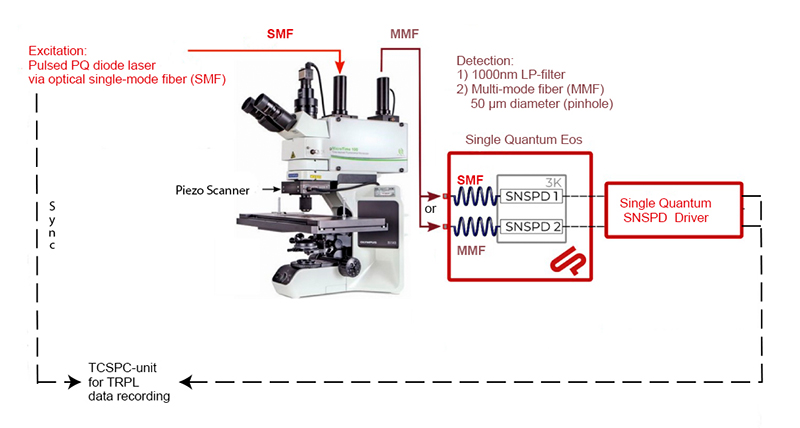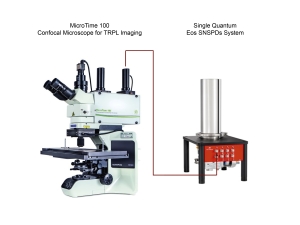Product Studies
MicroTime 100 SNSPDs coupling
Integration of SNSPDs into MicroTime 100 confocal microscope for time-resolved photoluminescence imaging
- Confocal TRPL imaging in NIR (800 – 1400 nm) spectral region
- High detection efficiency in NIR (> 70 %)
- Very high timing resolution in NIR (down to < 20 ps)
- Very low dark noise (< 100 counts/s)
- Plug-and-play SNSPDs coupling to a confocal MicroTime microscope
Description
Integration of a superconducting nanowire single-photon detectors (SNSPDs) into MicroTime 100 confocal microscope for time-resolved photoluminescence (TRPL) imaging
Acquiring time-resolved spectroscopic data at regions of interest (ROI) of a sample can help in inferring structural-to-photophysical relationships in different materials and giving information about important photophysical processes as well as changes in the local environment of emitting species. Gathering such information is an important step toward the optimization of structure as well as preparation process of e.g. optoelectronic or photovoltaic materials in order to increase their performance.

Powerful tool for materials science research
Especially challenging is TRPL-imaging in the NIR spectral range beyond 1000 nm, where most of the available on a market single photon detectors have low sensitivity, high dark noise and slow time response. At the same time, SNSPDs stand out due to very high detection efficiency (> 70 %) in NIR spectral range, picosecond time resolution (down to < 20 ps (FWHM)), and low dark noise (< 100 counts/s). We have demonstrated the combination of the MicroTime 100 upright confocal fluorescence lifetime microscope with the Single Quantum Eos SNSPDs as a powerful tool for photophysical research, yielding spatial and temporal information on semiconductor samples studied through TRPL emission. While one of the used SNSPDs had a classical single-mode fiber coupling to guide the light onto the sensor, the other detector used an internal multi-mode fiber instead. We have detected a significant increase in photoluminescence sensitivity of both designs compared to a standard NIR-PMT. The increased sensitivity combined with much lower dark count rate resulted in an increase of the signal-to-noise ratio by more than 3 orders of magnitude compared to the NIR-PMT.
Due to this outstanding performance, it was demonstrated, that the combination of the MicroTime 100 confocal system and the SNSPDs is capable of providing deeper insights into the relationships between structure and photophysical behavior even for very weakly luminescent samples. It should be emphasized that this information is hardly available when the TRPL of such a sample is detected with a conventional NIR-PMT.
Publication
Thank you for you inquiry.
We have received your message and will contact you as soon as possible.
×

